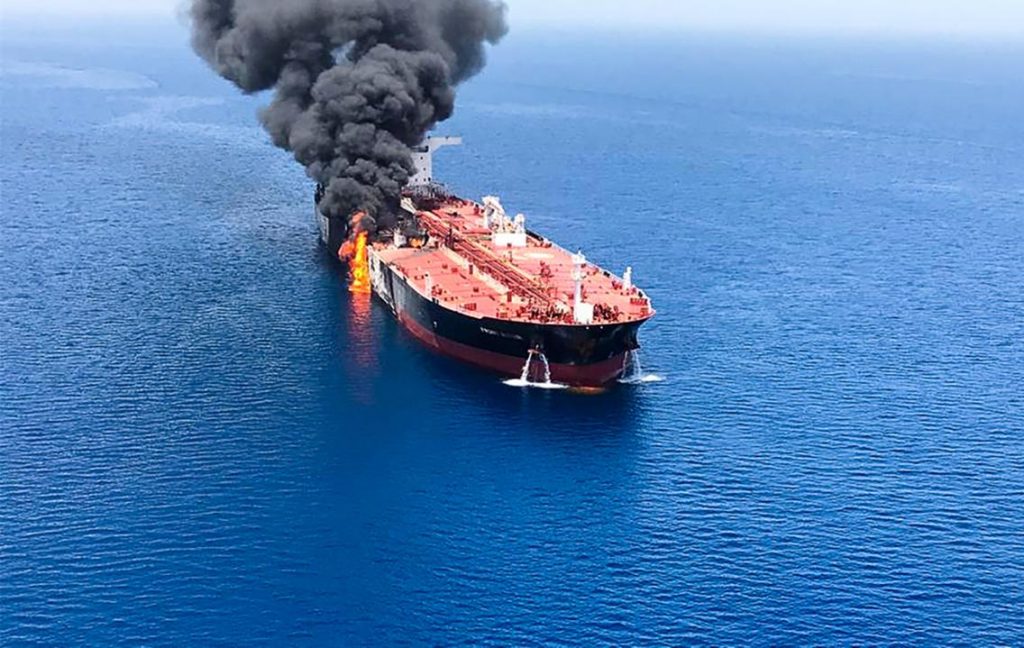IN THE MEDIA
Australia should back up US pressure on Iran with sanctions of its own
June 26, 2019 | Colin Rubenstein

An edited version of this article appeared in The Age – 26 June 2019
Forty years ago this year, the revolutionary Islamist regime in Iran held US embassy personnel hostage. Today, they are threatening to take the world hostage by menacing the free passage of oil through the strategic Strait of Hormuz, a natural maritime bottleneck through which around 30% of the world’s sea-borne crude oil passes.
This was the clear message of the attacks on two foreign oil tankers near the Strait in recent days and the four tankers sabotaged last month, almost certainly by Iran.
US President Donald Trump has actually shown considerable self-control in the face of increasing Iranian provocations. Having every right to respond militarily to Iran’s downing of a US drone over the Gulf of Oman on Thursday, the White House apparently decided to demonstrate strength through restraint by standing down a retaliatory strike at the last moment.
Trump’s decision to scrub the retaliatory strike was not surprising given that he has stated the US position on several occasions, that it is neither looking for war nor regime change but simply a strengthening of the deeply flawed 2015 Iranian nuclear deal, also known as the Joint Comprehensive Plan of Action (JCPOA), through renegotiation.
Indeed, crippling US sanctions on Iranian oil could be removed tomorrow if Iran were to agree to negotiate about some straightforward measures that would rectify the worst shortcomings in that flawed deal, and address Teheran’s other destabilising rogue behaviours.
The JCPOA was profoundly flawed because the inspections regime was insufficiently watertight, it enabled Iran to continue to develop ballistic missiles, enrich uranium, and work on advanced centrifuges and it appears very likely that Iran would be able to build nuclear weapons once the 10-year sunset clauses in the deal expired. Moreover, as critics predicted, the massive funds liberated by the deal turbo-charged Iran’s aggressive activities regionally and beyond.
While the UK, France, Germany, Russia, and China remain in the JCPOA, Iran has threatened that it would stop complying with key elements of the nuclear deal unless the remaining members help it blunt the impact of US sanctions. On June 17, Iran’s Atomic Energy Organisation declared that within 10 days Iran will have produced and kept more low-enriched uranium than the 300 kg permitted by the JCPOA, and also threatened to begin enriching uranium to higher levels of purity, closer to those required for a nuclear weapon. Teheran has given the international community until July 7 to meet its demands.
The attacks on the tankers were likely intended to send a message that Iran can choke the vital Strait of Hormuz if it desires to do so in the lead up to the July deadline. Iran likely calculated that this aggressive move could increase its leverage against the US, push the Europeans into finding a way around US sanctions, or both.
But Iran’s piracy and aggressive actions in the Persian Gulf should instead be a reminder that Iran is an inherently disruptive and dangerous rogue actor – whose violent behaviour must be rigorously and unwaveringly deterred and contained. Relying on the JCPOA to – hopefully – merely delay temporarily the Iranian nuclear bomb while allowing Iran to test missiles, run riot disruptively and aggressively on numerous other fronts across the region, and acting as the world’s foremost state sponsor of terrorism, should not be an option.
This conclusion should be underscored by the recent revelations in the UK about the global reach and malevolent intentions of Hezbollah, Iran’s most important international terrorist proxy.
On June 9, the UK Telegraph revealed that, in September 2015, raids on four properties in London uncovered three tonnes of ammonium nitrate explosive hidden in ice packs.
Similar multi-tonne Hezbollah explosives caches have been found in Cyprus and Bangkok. Furthermore, there is every reason to suspect that Hezbollah has or is attempting to establish further such caches in cities around the world to facilitate mass terror attacks whenever this serves the interests of their paymaster in Tehran.
The only real alternative to armed conflict at this point is strong and resolute international pressure on Iran to return to negotiations with the US, as President Trump has repeatedly urged, and end its aggressive provocations both in the Gulf and around the world.
Last year, when Australia reviewed its policy on Iran and decided to continue its support for the JCPOA despite the US withdrawal from it, the government committed to confront aggressive Iranian behaviour on other fronts. Prime Minister Scott Morrison proclaimed: ‘We will keep the option of additional autonomous sanctions under active review.’
Given the Iranian provocations in the Persian Gulf, and Iran’s plans to begin openly violating the JCPOA, now is the time for that review process to lead to major policy changes. In terms of its own profound national security interests and commitment to a stable rules-based international order, Australia should be doing whatever it can to contribute to the timely, calibrated and well justified US-led strategy of increasing the pressure on Iran.
Autonomous sanctions should be an important part of a larger program for Australia to contribute to efforts to maximise economic and diplomatic pressure on Iran as creatively and expansively as possible.





